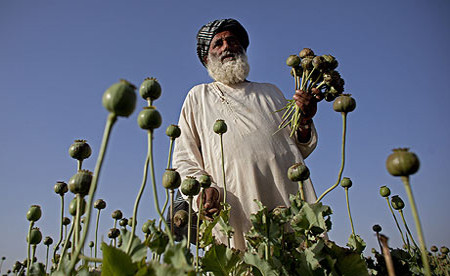Emma Graham-Harrison
Opium farming will increase across Afghanistan in 2012, driven by insecurity, massive corruption and economic fears for the future, spreading to more areas than it has in the past four to five years, the United Nations has warned.
Drugs help fund the Taliban insurgency, but Afghanistan's elite is also earning huge amounts from the trade and the government lacks the political will to clamp down on a crop worth hundreds of millions of dollars a year, the United Nations' leading drug control official in Afghanistan said.
The bleak figures were laid out in an annual risk assessment PDF, which has previously been announced with a press release but this year was uploaded to a UN website with no publicity.
Just 15 of Afghanistan's provinces, or well under half, are likely to be free of opium this year, the report said. In 2009 and 2010 poppy farming was eradicated from 20 provinces.
Asked about the report, Jean-Luc Lemahieu, country representative of the UN Office on Drugs and Crime in Afghanistan, warned: "We are back in the situation we had in 2007-08.
"For a long while, when we had 20 opium-free provinces, it seemed that we were able to push the opium back into the most insecure southern provinces. Today that is not any longer the case, and the governance issue is key to that," he told the Guardian.
"The Taliban definitely get income from opium cultivation ... but the lion's share of the income still disappears here, into the hands of the big patrons of this country," he added.
In 2011, the farm-gate value of opium production more than doubled from the previous year to $1.4bn (£880m) and now accounts for 15% of the economy, Reuters news agency reported.
Without strong signs from the government that it intends to clamp down on those within the system profiting from the drugs trade, the trend is unlikely to change, Lemahieu said.

An Afghan farmer cuts poppy bulbs near Kandahar. Afghanistan is the largest producer of opium poppies in the world – and output is expected to rise, according to the UN. (Photo: Majid Saeedi / Getty Images)
"The political will does not need to translate itself into putting everyone in prison, but to have a few good cases really indicating that the rules of the game are changing. And that is not happening today, or happening insufficiently."
The annual survey looks at poppy planting, and plans to cultivate the crop, so is not an absolute guarantee of production levels. Eradication programmes may take out some fields and low rainfall, crop blight or other farming problems can also reduce the actual harvest, later in the year.
But it gives a broad picture of trends and warns that opium cultivation seems clearly linked to security levels, which are declining in much of the country. Another UN office said recently that civilian deaths and injuries rose in 2011 to the highest level on record for the decade-long war.
"The Risk Assessment of this year indicated the strong association between insecurity, lack of agricultural assistance and opium cultivation," the report said. Instability makes it harder for government officials to monitor and eradicate crops, and also fuels demand from local factions – not necessarily linked to the insurgency – for money to buy weapons and pay fighters.
Central Ghor province and northern Takhar province are listed as the two areas that might lose their "poppy-free" status – meaning 100 hectares or less are cultivated – although the amount grown in both will still remain "insignificant" by Afghan standards, the report said.
Eight other provinces, spread across most of the country from Herat in the west to Uruzgan in the south, Nangarhar in the east and Badakhshan in the north-west, are expected to show an increase in opium poppy fields.
In a glimmer of good news, Helmand province, which grows more opium than the rest of the country put together, will not see a rise in production, and poppy crops are expected to fall in the Taliban's birthplace, neighbouring Kandahar.
The nationwide spread of the poppy is linked not just to the insurgency but to economic worries about the future as billions of dollars in aid and security spending that have been pumped into the country start to dry up.
The World Bank forecasts that Afghanistan's budget deficit after the 2014 deadline for foreign combat troops to withdraw could be as much as $7bn a year.
Opium has a very high value and can keep for years, and impoverished farmers who have survived three decades of conflict in Afghanistan are often acutely aware that it is one of their few forms of insurance against turmoil in coming years.
Lemahieu said: "The economy was really living from the international aid and security investments; all that will really disappear, so there are a lot of question marks with regard to what is to happen.
"From the farmer level, the trader level, it's an economic hedging for the future."
Prices have fallen by about a fifth from a year ago, to about $220 a kilogramme from $274 in March 2011, but are still high by historic standards; the high price was given as the main reason for growing opium by nearly three-quarters of village headmen surveyed for the United Nations.



